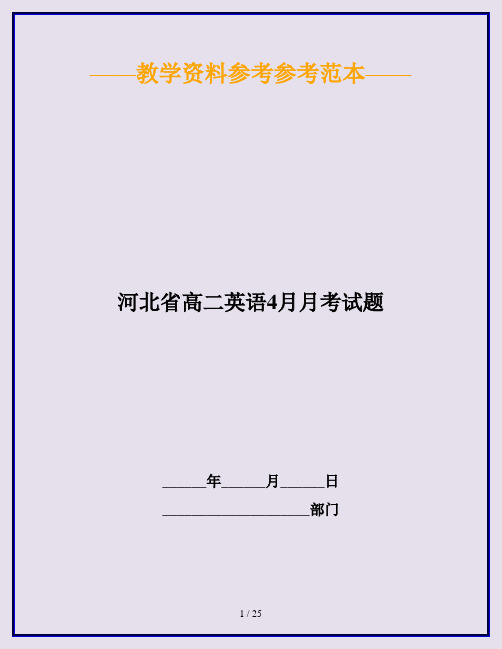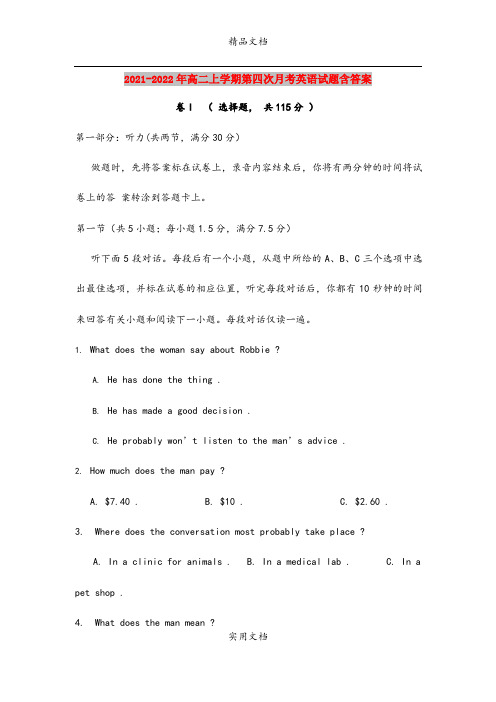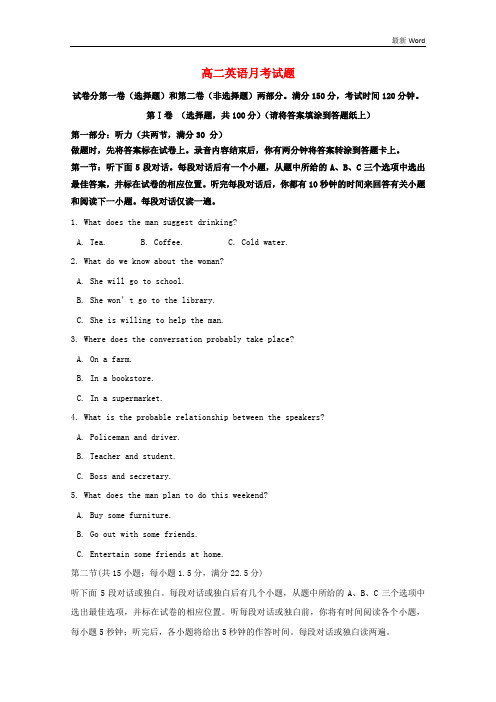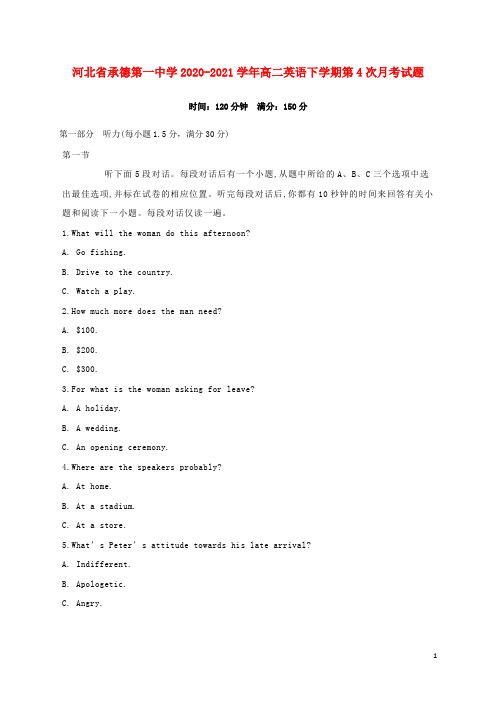河北省承德市围场卉原中学高二4月月考英语试题 扫描含答案
- 格式:doc
- 大小:1.73 MB
- 文档页数:11

——教学资料参考参考范本——河北省高二英语4月月考试题______年______月______日____________________部门说明:1、本试卷分第Ⅰ卷(选择题)和第Ⅱ卷(非选择题)两部分,第Ⅰ卷第(1)页至第(8)页,第Ⅱ卷第(9)页至第(12)页。
2、本试卷共150分,考试时间120分钟。
第Ⅰ卷(选择题,共90分)注意事项:1、答第Ⅰ卷前,考生务必将自己的准考证号、科目填涂在答题卡上。
2、每小题选出答案后,用2B铅笔把答题卡上对应的题目标号涂黑。
答在试卷上无效。
3、考试结束后,监考人员将试卷答题卡和机读卡一并收回。
第一部分:听力(共两节,满分20分)第一节(共5小题;每小题1分,满分5分)听下面5段对话。
每段对话后有一个小题,从题中所给的A、B、C三个选项中选出最佳选项,并标在试卷的相应的位置。
听完每段对话后,你都有10秒钟的时间来回答有关小题和阅读下一小题。
每段对话仅读一遍。
1.What does the man do at home?A. He washes the dishes.B. He does the gardening.C. He sweeps the floor.2. Where is Jenny now according to the woman?A. At the store.B. At the zoo.C. At home.3. What time is it now?A. About 8:00.B. About 9:00.C. About 10:00.4. What will the woman do tomorrow?A. Go to a party.B. Do some shopping.C. Have a rest at home.5. Who could the woman probably be?A. A house agent.B. A shop assistant.C.A flat owner.第二节(共15小题;每小题1分,满分15分)听下面5段对话。

2021-2022年高二上学期第四次月考英语试题含答案卷I (选择题,共115分)第一部分:听力(共两节,满分30分)做题时,先将答案标在试卷上,录音内容结束后,你将有两分钟的时间将试卷上的答案转涂到答题卡上。
第一节(共5小题;每小题1.5分,满分7.5分)听下面5段对话。
每段后有一个小题,从题中所给的A、B、C三个选项中选出最佳选项,并标在试卷的相应位置,听完每段对话后,你都有10秒钟的时间来回答有关小题和阅读下一小题。
每段对话仅读一遍。
1.What does the woman say about Robbie ?A.He has done the thing .B.He has made a good decision .C.He probably won’t listen to the man’s advice .2.How much does the man pay ?A. $7.40 .B. $10 .C. $2.60 .3. Where does the conversation most probably take place ?A. In a clinic for animals .B. In a medical lab .C. In a pet shop .4. What does the man mean ?A. He doesn’t like the party .B. He is too tired to go there .C. He hasn’t been invited .5. What does the boy choose clothes for ?A. A football match .B. A birthday party .C. A dance party.第二节(共l5小题;每小题l.5分,满分22.5分)请听下面5段对话或独白。
每段对话或独白后有几个小题,从题中所给的A、B、C三个选项中选出最佳选项,并标在试卷的相应位置。

2021-2022年高二4月月考英语含答案2021年高二4月月考英语含答案一、听力(共两节,满分30分)第一节(共5小题;每小题1.5分,满分7.5分)听下面5段对话。
每段对话后有一个小题,从题中所给的A、B、C三个选项中选出最佳选项,并标在试卷的相应位置。
听完每段对话后,你都有10秒钟的时间来回答有关小题和阅读下一小题。
每段对话仅读一遍。
1. What will the man probably do next month?A. Buy a new printer .B. Earn some money.C. Repair his puter.2. What do we know about the man?A. He doesn’t like his present job.B. He is looking for a new job.C. He will stop doing his job.3. When did the man’s train leave?A. At 6:00.B. At 6:25.C. At 7:30.4. Where will the woman go next week?A. To Japan.B. To France.C. To England.5. What does the woman remend the man to do?A. Cancel the credit card and get a new one.B. Ask the bank to cover the damage.C. Make a copy of his credit card.第二节(共15小题;每小题1.5分,满分22.5分)听下面5段对话或独白。
每段对话或独白后有几个小题,从题中所给的A、B、C三个选项中选出最佳选项,并标在试卷的相应位置。
听每段对话或独白前,你将有时间阅读各个小题,每小题5秒钟;听完后,各小题将给出5秒钟的作答时间。

高二英语月考试题试卷分第一卷(选择题)和第二卷(非选择题)两部分。
满分150分,考试时间120分钟。
第Ⅰ卷(选择题,共100分)(请将答案填涂到答题纸上)第一部分:听力(共两节,满分30 分)做题时,先将答案标在试卷上。
录音内容结束后,你有两分钟将答案转涂到答题卡上。
第一节:听下面5段对话。
每段对话后有一个小题,从题中所给的A、B、C三个选项中选出最佳答案,并标在试卷的相应位置。
听完每段对话后,你都有10秒钟的时间来回答有关小题和阅读下一小题。
每段对话仅读一遍。
1. What does the man suggest drinking?A. Tea.B. Coffee.C. Cold water.2. What do we know about the woman?A. She will go to school.B. She won’t go to the library.C. She is willing to help the man.3. Where does the conversation probably take place?A. On a farm.B. In a bookstore.C. In a supermarket.4. What is the probable relationship between the speakers?A. Policeman and driver.B. Teacher and student.C. Boss and secretary.5. What does the man plan to do this weekend?A. Buy some furniture.B. Go out with some friends.C. Entertain some friends at home.第二节(共15小题;每小题1.5分,满分22.5分)听下面5段对话或独白。

河北省承德第一中学2020-2021学年高二英语下学期第4次月考试题时间:120分钟满分:150分第一部分听力(每小题1.5分,满分30分)第一节听下面5段对话。
每段对话后有一个小题,从题中所给的A、B、C三个选项中选出最佳选项,并标在试卷的相应位置。
听完每段对话后,你都有10秒钟的时间来回答有关小题和阅读下一小题。
每段对话仅读一遍。
1.What will the woman do this afternoon?A. Go fishing.B. Drive to the country.C. Watch a play.2.How much more does the man need?A. $100.B. $200.C. $300.3.For what is the woman asking for leave?A. A holiday.B. A wedding.C. An opening ceremony.4.Where are the speakers probably?A. At home.B. At a stadium.C. At a store.5.What’s Peter’s attitude towards his late arrival?A. Indifferent.B. Apologetic.C. Angry.第二节听下面5段对话或独白。
每段对话或独白后有几个小题,从题中所给的A、B、C 三个选项中选出最佳选项,并标在试卷的相应位置。
听每段对话或独白前,你将有时间阅读各个小题,每小题5秒钟;听完后,各小题将给出5秒钟的作答时间。
每段对话或独白读两遍。
听下面一段对话,回答第6和第7两个小题。
6.What is the woman?A. A student.B. An editor.C. A professor.7.Why does the woman want to put a message?A. To sell something.B. To hire an English teacher.C. To find a language partner.听下面一段对话,回答第8和第9两个小题。

河北省承德市2017-2018学年高二英语上学期第四次月考试题第I卷(100分)第一部分:听力(共两节,满分30分)第一节(共5小题;每小题1.5分,满分7.5分)听下面5段对话。
每段对话后有一个小题,从题中所给的A、B、C三个选项中选出最佳选项,并标在试卷的相应位置。
听完每段对话后,你都有10秒钟的时间来回答有关小题和阅读下一小题。
每段对话仅读一遍。
1.Where is the man’s mother now?A. At home.B. In a hospital.C. At a bus stop.2.Where is the man going first?A. To the Healey Supermarket.B. To the airport.C. To Canada.3.How does the man feel about his job?A. He enjoys it very much.B. He doesn’t care much about it.C. He hates working late.4.On which days next week will the man have examinations?A. Every day except Thursday.B. Monday ,Wednesday and Friday.C. Monday, Tuesday and Friday.5.What does the woman mean?A. He cannot make a copy because of the copyright.B. He can make his copy by himself.C. He should wait until tomorrow.第二节(共15小题;每小题1.5分,满分22.5分)听下面5段对话或独白。
每段对话或独白后有几个小题,从题中所给的A、B、C三个选项中选出最佳选项,并标在试卷的相应位置。
高二年级英语(yīnɡ yǔ)第四次月考试卷(shìjuàn) 〔满分是150分,考试时间(shíjiān)是是120分钟,请将答案做在答题卡上〕第一卷第一(dìyī)局部听力(一共两节,满分是30分)第一节 (一共5小题;每一小题l .5分,满分是7.5分)听下面5段对话,每段对话后有一个小题,从题中所给的A、B、C三个选项里面选出最正确选项,并标在试卷的相应位置。
听完每段对话后,你都有10秒钟时间是来答复有关小题和阅读下一小题。
每段对话仅读一遍。
1、When do the speakers plan to have a picnic?A.In the early morning B.In the mid-morning C.In the afternoon2、Where does this conversation most probably take place?A.At a clothing store. B.At a tailor's shop. C.At a sports center.3、What do we know about the woman and David?A.She has met him before.B.She gets along well with him.C.She knows something about him.4、What time will the woman meet the man?A.At 10:00. B.At 10:20. C.At 10:40.5、What is the man going to do this morning?A.Do his work. B.Go out with Linda. C.Enjoy the sunshine in the open.第二节〔一共(yīgòng)15小题;每一小题1.5分,满分是22.5分〕听下面5段对话或者独白。
高二下学期4月月考英语试题说明:1.本卷共12页,包括第1卷(选择题)和第Ⅱ卷(非选择题)两部分。
满分150分,考试时间120分钟。
2.在答题卡的密封线内填写学校、班级、姓名、考号等,密封线内不要答题。
3.请将所有答案均按题号填涂或填写在答题卡相应的答题处,否则不得分。
第I卷(满分115分)第一部分听力理解(共两节20小题,满分30分)第一节(共5小题;每小题1.5分,满分7.5分)听下面5段对话。
每段对话后有一个小题,从题中所给的A、B、C三个选项中选出最佳选项。
听完每段对话后,你都有10秒钟的时间来回答有关小题和阅读下一小题。
每段对话仅读一遍。
1.How many children are there in the classroom?A. FiveB. SevenC. Twelve2. What will the man do?A. Go to see a tooth doctor.B. Eat out with the womanC. Eat out with a doctor.3. What will the man stay at home to do?A. To answer the phone,B. To have his telephone fixed.C. To call the telephone company.4. When will the speakers probably have a picnic?A. This afternoonB. Tomorrow morningC. Tomorrow afternoon5. What has happened to the man?A. He has just given up his job.B. He has started his own business.C. He has got promoted(提升) as a boss.第二节(共15小题;每小题1.5分,满分22.5分)听下面5段对话或独白。
高二英语月考试题(考试时间100分钟满分120分)第一部分听力(共两节,每题1.5分,满分30分)做题时,先将答案标在试卷上,录音结束后,你将有两分钟的时间将试卷上的答案转涂到答题卡上。
第一节(共5小题,每小题1. 5分,满分7. 5分)听下面5段对话,每段对话后有一个小题,从题中所给的A、B、C三个选项中选出最佳答案。
听完每段对话后,你都有10秒钟的时间来回答有关小题和阅读下一小题。
每段对话仅读一遍。
例:How much is the shirt?A.£ 19. 15B.£9. 18 C.£9. 15答案是C。
1. What will the woman do this afternoon?A. Do some exercise.B. Go shopping.C. Wash her clothes.2. Why does the woman call the man?A. To cancel a flight.B. To make an apology.C. To put off a meeting.3. How much more does David need for the car?A. $ 5, 000.B. $20, 000.C. $25, 000.4. What is Jane doing?A. Planning a tour.B. Calling her father.C. Asking for leave.5. How does the man feel?A. Tied.B. Dizzy.C. Thirsty.第二节(共15小题;每小题1. 5分,满分22. 5分)听下面5段对话或独白。
每段对话或独白后有几个小题,从题中所给的A、B、C三个选项中选出最佳选项。
听每段对话或独白前,你将有时间阅读各个小题,每小题5秒钟;听完后,各小题将给出5秒钟的作答时间。
河北高二高中英语月考试卷班级:___________ 姓名:___________ 分数:___________一、阅读理解1.I know what you’re thinking: pizza (比萨饼)? For breakfast? But the truth is that you can have last night’s leftovers in the a. m. if you want to.I know lots of women who skip breakfast (不吃早餐), and they have a ton of different excuses for doing it. Some say they don’t have time, others think they’re “saving” calories (卡路里), still others just don’t like breakfast food. But the bottom line is that eat ing in the morning is very important when you’re trying to lose weight. “Eating just about anything from 300 to 400 calories would be better than nothing at all,” says Katherine Brooking, R, D, who developed the super-easy eating plan for this year’s “SELF CHALLENGE”. And even pizza can be healthy if it’s loaded with vegetables, and you stick to one small piece.Breakfast is one meal I never miss, and the same goes for most weight loss success stories. Research shows that eating breakfast keeps you from overeating later in the day. Researchers at the University of Southern California found that breakfast skippers have a bigger chance of gaining weight than those who regularly have a morning meal.So eat something in the morning, anything. I know plenty of friends who end up having no breakfast altogether, and have just coffee or orange juice. I say, try heating up last night’s leftovers-it may sound crazy, but if it works for you, do it! I find if I tell myself, “You can always cat it tomorrow,” I put away th e leftovers instead of eating more that night. Try it...you may save yourself some pre-bedtime calories. And watch your body gain the fat-burning effects.【1】The word “leftovers” in Paragraph I probably means .A.food remaining after a meal B.things left undoneC.meals made of vegetables D.pizza topped with fruit【2】What can we infer from the text?A.Working women usually have breakfast in a hurry.B.Many people have wrong ideas about breakfast.C.There are some easy ways of cooking a meal.D.Eating vegetables helps save energy.【3】According to the last paragraph, it is important to .A.eat something for breakfast B.be careful about what you eatC.heal up food before eating it D.eat calorie-controlled food【4】The text is written mainly for those .A.who go to work early B.who want to lose weightC.who stay up late D.who cat before sleep2.How I Turned to Be OptimisticI began to grow up that winter night when my parents and I were returning from my aunt’s house, and my mother said that we might soon be leaving for America. We were on the bus then. I was crying, and some people on the bus were turning around to look at me. I remember that I could not bear the thought of never hearing again the radio program for school children to which I listened every morning.I do not remember myself crying for this reason again. In fact, I think I cried very little when I was saying goodbye to my friends and relatives. When we were leaving I thought about all the places I was going to see—the strange and magical places I had known only from books and pictures. The country I was leaving never to come back was hardly in my head then.The four years that followed taught me the importance of optimism (乐观), but the idea did not come to me atonce. For the first two years in New York I was really lost-having to study in three schools as a result of family moves. I did not quite know what I was or what I should be. Mother remarried, and things became even more complex (复杂的) for me. Some time passed before my stepfather and I got used to each other. I was often sad, and saw no end to “the hard times.”My responsibilities in the family increased a lot since I knew English better than everyone else at home. I wrote letters, filled out forms, translated at interviews with Immigration officers, took my grandparents to the doctor and translated there, and even discussed telephone bills with company representatives.From my experiences I have learned one important rule: almost all common troubles finally go away! Something good is certain to happen in the end when you do not give up, and just wait a little! I believe that my life will turn out all right, even though it will not be that easy.【1】How did the author get to know America?A.From her relatives.B.From her mother.C.From books and pictures.D.From radio programs.【2】For the first two years in New York, the author .A.often lost her way B.did not think about her futureC.studied in three different schools D.got on well with her stepfather【3】What can we learn about the author from Paragraph 4?A.She worked as a translator.B.She attended a lot of job interviews.C.She paid telephone bills for her family.D.She helped her family with her English.【4】The author believes that .A.her future will be free from troublesB.it is difficult to learn to become patientC.there are more good things than bad thingsD.good things will happen if one keeps trying3.Is reading better than watching TV? I believe it is. Is reading better than playing video games? I’m not so sure if it is. If learning is important to you, but not necessarily so, and if pleasure is what you want, these activities can be pleasant in their own way. Reading might be better than many activities if you want to educate yourself and improve your chances of succeeding in your work.If you’re serious about creating the habit of reading, what’s important is finding a time you can read every day-often that’s early morning or late at night, or both. For others, it might be during their lunch break. You only need to read for 10 to 20 minutes a day to form the habit. Then, you need to find a place that’s comfortable. Make sure it has good lighting, the temperature is nice and you’re in a good chair. Or you can find some place that you can reiax in without failing asleep, although there’s nothing wrong with a sl eep.Next, be sure to shut off the TV, Internet, cell phone, radio, or other music .Let reading be a quiet time. Mark an “x” on your calendar every day you read, and try to keep your unbroken “x”es going as long as possible. A habit is much easier to form if it’s something you enjoy, not something you are made to do. So make the time you spend reading a joy. I’ve been a lifelong reader, so the pleasure of a good book is one of my favorite things in the world. I love to lose myself in the world of a book.【1】The importance of reading depends on .A.what you’re going to read B.why you want to readC.where you decide to read D.when you begin to read【2】If you want to create a habit of reading, the first thing to do is to .A.ask the writer for some advice B.find a comfortable placeC.make a proper time plan D.mark an “x” on the new calendar【3】While you are reading, you’d better .A.make sure you are alone B.mark a big “x” in your notebookC.find a good chair with good lighting D.be concentrated and quiet【4】Reading may become your habit more easily when .A.it is something you enjoyB.you don’t use Internet or cell phonesC.your unbroken “x”es last for a long timeD.you spend 10 to 20 minutes reading after lunch4.New research shows sheep are cleverPeople often make jokes about how dull sheep are, but new research shows they may be cleverer than we think. Researchers at the University of Cambridge discovered that Welsh mountain sheep have brainpower that equals rodents (啮齿动物). Tests found that the sheep can map the area they live in, and some may even be able to plan ahead.Young fish prefer noisy neighborsA new study has shown that young fish like to live on reefs (暗礁) with noisy neighbors! Researchers from the universities of Auckland and Bristol found that young fish looking for a home choose areas where other noisy fish live. The scientists produced all kinds of sounds which had been recorded in different natural environments. The young fish seemed to prefer the sounds of natural reefs, compared with noisy animals! The scientists compared the choice to a music fan wandering around at a music festival, choosing to set up a tent closest to the music they like best!Butterflies are disappearingA new study has shown that 17 species (物种) of butterfly found in Europe have dropped by 70% in the last 20 years. The information collected from 3,000 sites across 15 countries shows it may be caused by the loss (减少) of grasslands covered with flowers. You can encourage butterflies to come into your garden by planting flowers. 【1】What is the passage mainly about?A.Some new studies about animals.B.People’s wrong ideas about animals.C.Why the number of animals has dropped.D.The importance of protecting animals.【2】According to the first paragraph, we may infer that sheep .A.are less clever than rodents B.can find their homeC.can read maps D.are good planners【3】Which seems to have something to do with the number of butterflies?A.The species of grass in grasslands.B.The species of trees in grasslands.C.The number of flowers in grasslands.D.The number of animals in grasslands.二、其他Learning a second languageNowadays, more and more people are learning a second language. So why should we spend time learning asecond language? 【1】. Let us see.CareerIf your work involves regular contact with speakers of foreign languages, being able to talk to them in their own language will help you to communicate with them better.【2】 Knowledge of foreign languages may also increase your chances of finding a new job, getting a promotion or a transfer overseas, or of going on foreign business trips.TravelBeing able to speak a foreign language, for example, the Japanese language, would benefit you greatly should you be traveling to Japan.【3】 If you are fond of tourism, then knowledge of the local language is a must-have to avoid bad experiences or discomfort.【4】If you are a high school student who is interested in going abroad for further education, then you will have to learn the language of the country which you wish to move to. In some countries, being able to speak that country’s national la nguage is a must for students wishing to pursue (继续) education there.Personal growthLearning a second language can help in broadening one’s horizons(视野). It can help in learning about the culture of that particular country.【5】 Not only can you enjoy different forms of art and literature relating to the new language, but you can also meet new people, make new friends and develop long-lasting relationships.A.EducationB.Challenge.C.Is it really worth it?D.This will save you a lot of trouble.E. It can help you to make sales and get good deals.F. And it can open the way for new interests and hobbies.G. Could you be required to study a particular language at school?三、完形填空I never thought I’d be a “runner”. I was the girl who ______ slowest in the PE class. A few years ago, I was walking with a group of ______ in the Race for the Cure, a 5KM race designed to ______ money for the fight against breast cancer,______ one lady caught my ______.She was one of the weakest-looking women I’ve ever se en. She must have been close to seventy yearsold,______ a T-shirt with the word “Survivor.” She was so small that it seemed as if she could even be ______ by a swift wind. But she was running. And she was ______ me my group of friends. She ran slowly, but______—as if each step pushed her cancer further into her past. Right at that moment, I ______ that in the next Race for the Cure, I’d be running along with her.A week later, I found myself in the ______, running on the treadmill (跑步机). Three minutes after I started, my face was bright red. I felt like my lungs were going to ______. I had to slow down to a walk. I thought of the______ at the race. I kept it up. I was able to go a little ______ each time. Three and a half minutes. Four minutes. Five.A year later, I was ______ at the Race for the Cure, but this time, I ______ with the runners. When the race started, the other runners passed me by. I ran forward. I wondered if I’d be ______ to do it. But then, I remembered the brave woman. I ran as fast as I could until I finally crossed that finish line. I had just ______ my first race! I looked down at my legs, ______. They had done something I’d never thought ______. I have never felt stronger than at that moment. And, I knew that I wanted to do it again.【1】A.talked B.walked C.ran D.swam【2】A.friends B.teachers C.students D.patients【3】A.save B.use C.make D.raise【4】A.while B.when C.until D.before【5】A.breath B.hand C.arm D.eye【6】A.wearing B.holding C.pulling D.waving 【7】A.turned down.B.turned over C.taken over D.taken down 【8】A.passing B.watching C.greeting D.calling 【9】A.strangely B.determinedly C.excitedly D.anxiously 【10】A.agreed B.learned C.decided D.explained 【11】A.shop B.street C.park D.gym 【12】A.burst B.fail C.open D.crack 【13】A.prize B.survivor C.plan D.woman 【14】A.earlier B.longer C.harder D.farther 【15】A.even B.again C.ever D.still 【16】A.fought B.traveled C.queued D.wailed 【17】A.likely B.eager C.ready D.able 【18】A.finished B.won C.entered D.missed 【19】A.confused B.satisfied C.amazed D.amused 【20】A.good B.right C.possible D.necessary四、其他Stephen Hawking, who is the most famous physicist, was born in Britain on January 8th, 1942. As a child, he was enthusiastic about 【1】 (design) complicated toys but【2】 (fortune), in his twenties, he suffered【3】 a disease that was impossible to be cured,【4】 was a great challenge for him. However, not only was he positive about the misfortunes, and eventually he 【5】 (defeat) all the obstacles but also he was【6】 (absorb) in his research in the universe. In 1988, his best-seller A Brief History of Time【7】 (publish), in which he put forward the idea【8】 time itself has a beginning, and that it will have【9】 end. In【10】 (conclude), he has made outstanding contributions to the fields of cosmology and quantum gravity.五、短文改错假定英语课上老师要求同桌之间交换修改作文,请你修改你同桌写的以下作文。